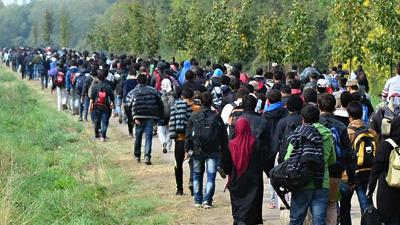NCA conference panel spotlights Page Center’s Refugee Communications project
November 18, 2015 • Jonathan McVerry

Many countries around the world are facing refugee crises of varying magnitudes. Communication has been an integral piece to each situation’s puzzle for those affected by the crises and those living outside these areas.
Page Center senior research fellow Colleen Connolly-Ahern is leading a panel on this topic at the National Communication Association’s (NCA) annual convention in Las Vegas. The presentation (Nov. 19 at 12:30 p.m.) will feature four studies that examine communications within and around crises occurring on three continents. The research projects are a part of the Arthur W. Page Center’s Refugee Communications initiative, which Connolly-Ahern leads.
The program is titled “Communicating in the Interest of Human Dignity: The Arthur W. Page Refugee Communication Project.”
Along with collaborators Nadia Martinez-Carrillo and Daniel Tamul from Indiana-Purdue University, Connolly-Ahern will discuss a content analysis of websites, chat rooms and other media used by refugees. The study specifically examines refugees affected by drug trafficking in Mexico, Honduras, El Salvador and Costa Rica. The trio of researchers also conducted in-depth interviews with crisis responders to reveal communication origins within the current crisis.
Researchers from Iowa State University (Daniela Dimitrova) and the University of Bilkent in Turkey (Emel Ozdora) will also discuss their research, which compares the coverage of the escalating Syrian refugee crisis in Turkey and Bulgaria. Although neighbors, these two countries have drastically different cultures. The researchers studied the differences between each country’s handling of the crisis and how it has affected attitudes toward the situation.
Penn State College of Communications graduate students Akshaya Sreenivasan and Steve Bien-Aime will present research on the role of information communications technology in refugee decision-making. Specifically, they will overview their investigation of how asylum seekers in Catania and Sicily make decisions based on their level of access to communications technology.
The role of media in how asylum seekers and marginalized minorities are “remembered” will also be featured in the panel discussion. Researchers Noam Tirosh and Amit Schejter of Ben Gurion University in Israel studied the memory building processes of 25 African refugees residing in Israel.
The program is sponsored by the International and Intercultural Communication Division, an interest group within NCA.
Using a variety of research methods, the Arthur W. Page Refugee Communication initiative seeks to form a working group of researhers that examine best practices in ethical communication surrounding refugees.
(Photo: iStockPhoto)

